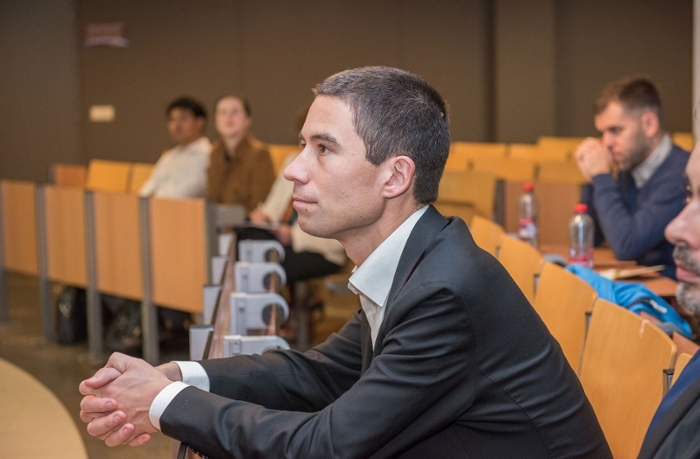
Professor Ludo Waltman. Photo courtesy of Universiteit Leiden.
The recent UniSIG meeting held in Utrecht on 31 January drew a large crowd and generated much discussion. This was not too surprising given that the invited speaker, Prof. Ludo Waltman, touched on an intriguing and relevant topic, namely ‘Editing an international scientific journal: The English language challenge’. As the deputy director of the Centre for Science and Technology Studies (CWTS) at Leiden University, a researcher in the field of bibliometrics and scientometrics, and currently the Editor-in-Chief of Quantitative Science Studies, he has amassed unique insights into research management and science policy, and how these impinge on publication practice. In his presentation for UniSIG, Prof. Waltman discussed four main points related to the English language challenge: authors, China, peer reviewers and journal publishers.
Research globalization can have a negative impact on authors from non-English-speaking countries
In an increasingly globalized research publication system (explore here) and under pressure to publish in highly ranked journals to stay competitive and funded, many researchers whose native language is not English submit their work to international journals. From a journal editor’s perspective, a recurrent question in assessing submissions is where to draw the line on language quality. While there is no shortage of available language services, it is unclear whether authors that need the most help can actually afford it, and whether the cheapest of these services are indeed of high enough standard.
Another issue related to authors from non-English-speaking countries publishing in international journals, especially in the fields of social science and the humanities, is the risk that research on locally relevant, impactful topics may go undone in the drive to publish in international journals, or alternatively cost researchers all-important citations when publishing in local-language journals. Being aware of the benefits and drawbacks of research globalization and the use of citation metrics in that setting is therefore paramount, as outlined in the Leiden Manifesto for research metrics.
Recent changes in Chinese publication policy may affect submissions from Chinese authors
A related and subsequent point that Prof. Waltman focused on was the significant rise in publications from Chinese authors. Depending on what database is used, China has now almost caught up – or even overtaken – the US in the number of English-language manuscripts published in international journals. This has been largely driven by science policy encouraging globalization of Chinese research, not only by financially rewarding authors for publishing in highly ranked international journals, but also by funding students to attend universities abroad.
For editors of international journals, the increase in volume of manuscripts alone is a persistent issue, with language quality adding another layer of complexity. It will be interesting to see how these trends change in the near future, in light of the apparent change in publication policy in China, which aims to encourage scientists to publish their best science in China.
What to do about poorly written peer review reports?
Where there are manuscripts, there have to be peer reviewers, and these pose the next challenge for a journal editor. In the days of increasing manuscript volumes, finding appropriate reviewers has become a big challenge. Since journal editorial boards alone cannot handle the volume of manuscripts submitted, other experts in the field are often asked to help with the peer review process. But while help from language editors can rectify authors’ poor English, similar assistance is rarely sought or provided for peer review reports. Reviewers' poor English-language skills, along with an increasing trend for open peer review, can discourage many potential reviewers from participating.
For journal editors, one potential way to mediate this problem would be to adopt a review process similar to that of the journal eLife where the handling editor facilitates a discussion among all reviewers, and then formulates a single clear list of necessary revisions to share with the author. Another possibility is for language editors to offer peer review report editing services, although it is unclear whether the researchers that need such assistance the most could afford it.
Publishers decide on whether open access publication fees cover copyediting
In the final part of his presentation, Prof. Waltman discussed publishers, their wide-ranging views on supporting language quality, and several other aspects important in scientific publishing. As Editor-in-Chief, first of the Journal of Informetrics, published by Elsevier, and currently of Quantitative Science Studies, published by MIT press, he has first-hand experience (more on Prof. Waltman's move from one journal to another can be found here.
We discovered that publishers differ hugely in the amount they charge for open access publication. Within this pricing structure, one publisher may provide no copyediting, while another is able to provide a relatively thorough service to its authors. Therefore, journal editors often have their hands tied, even if they would like to provide more help to non-native-English authors.
The work of authors' editors is unlikely to be affected by new developments just yet
To conclude, Prof. Waltman outlined two possible developments that could ease the English language challenge in the future. One that SENSE members are already keenly aware of is machine translation. Though not yet on par with a qualified human translator, it will undoubtedly continue improving and perhaps soon level the playing field for non-English-speaking researchers, especially those with restricted budgets. Another possibility is that, instead of publishing articles, researchers may one day simply publish their data as nanopublications – defined as the smallest unit of publishable information. In the meantime, though, it is clear that SENSE members will still have a lot of work on their hands helping international authors refine their manuscripts.
This blog post is a summary; for the full event report, please see the SENSE Forum (members only). A final note: The PDF of Prof. Waltman’s presentation is available to SENSE members upon request by

